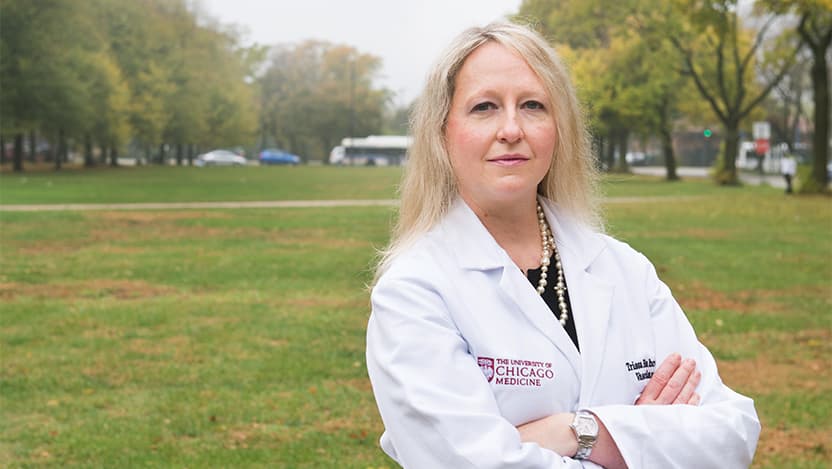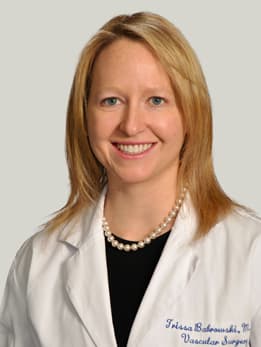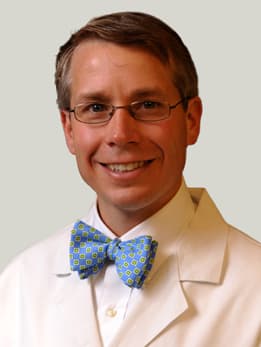UChicago Medicine limb salvage expert makes an impact on patients on Chicago’s South Side

Approximately one in 10 people in the United States have diabetes. If not managed correctly, diabetes can lead to peripheral artery disease (PAD). PAD causes blood vessels to narrow and reduces blood flow to legs and feet. Reduced blood flow can slow wound healing and increase the likelihood of an infection to spread to the bone. If an infection cannot be stopped or the damage is irreversible, amputation may be necessary.
After taking a close look at the high rate of amputation on the South Side of Chicago in 2015, Christopher L. Skelly, MD, University of Chicago Medicine chief of vascular surgery and endovascular therapy, and vascular surgeon Trissa A. Babrowski, MD, knew they wanted to create a program to serve more patients. Patients with diabetes living in low- to middle-income communities face unique challenges related to lack of awareness, difficulty with access to care and medications, and, often, failure to properly manage and prevent complications of the disease like limb amputation.
“When we compare patients in our geographic region to patients anywhere else in the country, the amputation rate in the South Side of Chicago is about 20 times the national average, which is shocking and totally unacceptable,” said Babrowski.
Skelly and Babrowski decided to collaborate with colleagues at the limb salvage.
“It’s not just about what we as vascular surgeons are able to provide. The plan needs to be systematic and should support the overall care of the patient,” said Babrowski. “That involves podiatry, for toe amputations and foot wound management, and plastic surgery, because often times these patients need complex wound closures or a flap for coverage. It’s also important to involve the endocrinologists, who are responsible for managing the patients’ diabetes long-term.
"It really needs to be a holistic effort,” she said. “Although we work in our own silos, the Limb Salvage Program is all about working together to salvage legs.”
Losing a limb, or any part of the foot, is traumatic. It takes a toll on patients and their families not only emotionally, but economically as well. The ravages of diabetes may affect a patient’s ability to work or to care for another family member’s children, which in turn affects that family member’s ability to work. Babrowski recognizes the striking healthcare disparities within this community and not only supports patients medically, but show a sense of compassion which ultimately contributes to their healing and improves the quality of their lives.
“We struggled greatly with the concept of video visits, because our patients don’t have access to the technology to connect with us. While it’s nice to be able to maintain connection via telephone visits, I can’t see them, and I can’t look at their feet. A lot of the patients can’t look at their feet themselves,” she said.
Despite the challenges of connecting virtually with patients, it is vital to build effective plans of care and also establish a foundation of trust. Babrowski is committed to building partnerships that extend beyond the clinic.
“I always tell patients that I’m not their doctor, I’m their partner. We’re in this together, working toward saving their legs,” said Babrowski. “Vascular disease is not curable. But we manage it in a way that helps patients gain longevity in their legs and their lives. That’s what this is really all about.”
“She is truly an unsung hero, fighting the good fight every day,” said Skelly.
As a South Sider herself, she has the ability to connect with neighborhood patients. They value that familial sense of closeness, which makes them open and willing to build partnerships with her. She’s often referred to by her patients and colleagues as the “Limb Whisperer.” Her maternal tough-love approach gives her patients that extra boost they need to get over their last (or first) hurdle.
After taking a close look at the high rate of amputation on the South Side of Chicago in 2015, Christopher L. Skelly, MD, University of Chicago Medicine chief of vascular surgery and endovascular therapy, and vascular surgeon Trissa A. Babrowski, MD, knew they wanted to create a program to serve more patients. Patients with diabetes living in low- to middle-income communities face unique challenges related to lack of awareness, difficulty with access to care and medications, and, often, failure to properly manage and prevent complications of the disease like limb amputation.
“When we compare patients in our geographic region to patients anywhere else in the country, the amputation rate in the South Side of Chicago is about 20 times the national average, which is shocking and totally unacceptable,” said Babrowski.
Skelly and Babrowski decided to collaborate with colleagues at the limb salvage.
Holistic care for a vulnerable population
On the South Side of Chicago, a disproportionate number of people have diabetes, as well as renal failure, compared to the national average. These illnesses can lead to significant peripheral arterial disease — and amputations. Babrowski, director of the Limb Salvage Program, and her team found it imperative to formalize a process for patients to receive holistic care and optimal treatment from a multidisciplinary team, an approach for which UChicago Medicine is renowned.“It’s not just about what we as vascular surgeons are able to provide. The plan needs to be systematic and should support the overall care of the patient,” said Babrowski. “That involves podiatry, for toe amputations and foot wound management, and plastic surgery, because often times these patients need complex wound closures or a flap for coverage. It’s also important to involve the endocrinologists, who are responsible for managing the patients’ diabetes long-term.
"It really needs to be a holistic effort,” she said. “Although we work in our own silos, the Limb Salvage Program is all about working together to salvage legs.”
Debilitating disease and limb loss
In the US alone, there are approximately 1 million diabetics who have wounds and some type of amputation — a toe, foot or leg. Diabetics’ blood contains a substantial amount of sugar, which is problematic because bacteria thrive in a sugar-rich environment. Infections settle in and procreate rapidly. Many of these patients suffer from diabetic infections— wounds that have become severely infected with bacteria.Losing a limb, or any part of the foot, is traumatic. It takes a toll on patients and their families not only emotionally, but economically as well. The ravages of diabetes may affect a patient’s ability to work or to care for another family member’s children, which in turn affects that family member’s ability to work. Babrowski recognizes the striking healthcare disparities within this community and not only supports patients medically, but show a sense of compassion which ultimately contributes to their healing and improves the quality of their lives.
Longevity in their legs and their lives
The COVID-19 outbreak caused a slowdown for many areas of the hospital; however, there was a sharp rise in amputation patients. Beginning in March 2020, Babrowski was operating every day, and this continued for more than six weeks straight. Many patients needed an urgent amputation, largely due to neglect, fear and lack of access. Strict social distancing guidelines mandated virtual visits which presented some challenges.“We struggled greatly with the concept of video visits, because our patients don’t have access to the technology to connect with us. While it’s nice to be able to maintain connection via telephone visits, I can’t see them, and I can’t look at their feet. A lot of the patients can’t look at their feet themselves,” she said.
Despite the challenges of connecting virtually with patients, it is vital to build effective plans of care and also establish a foundation of trust. Babrowski is committed to building partnerships that extend beyond the clinic.
“I always tell patients that I’m not their doctor, I’m their partner. We’re in this together, working toward saving their legs,” said Babrowski. “Vascular disease is not curable. But we manage it in a way that helps patients gain longevity in their legs and their lives. That’s what this is really all about.”
The Limb Whisperer fights for her patients
In the thick of the pandemic, a stoic Babrowski was stationed on the frontlines. The work did not stop and neither did the complexities of life. She lost her father and mother-in-law this year, yet even while grieving in isolation with the inability to mourn among family, she has continued dauntlessly to lead the Limb Salvage Program and uphold close partnerships with her patients.“She is truly an unsung hero, fighting the good fight every day,” said Skelly.
As a South Sider herself, she has the ability to connect with neighborhood patients. They value that familial sense of closeness, which makes them open and willing to build partnerships with her. She’s often referred to by her patients and colleagues as the “Limb Whisperer.” Her maternal tough-love approach gives her patients that extra boost they need to get over their last (or first) hurdle.

Trissa Babrowski, MD
Trissa Babrowski, MD, is an expert in vascular surgery. Dr. Babrowski specializes in the treatment and management of complex vascular and aortic conditions, with a primary focus on limb salvage.
Learn more about Dr. Babrowski
Christopher Skelly, MD
Christopher Skelly, MD specializes in vascular surgery. He performs a full range of open and endovascular procedures, including the treatment of carotid disease, complex aortic pathologies and peripheral vascular disease.
Read more about Dr. SkellyVascular Disease
Our highly skilled multidisciplinary team diagnoses, manages and treats all types of vascular conditions, and we analyze each case individually to design a tailored treatment strategy that will cater to our patient's distinct needs.
Explore our vascular disease services